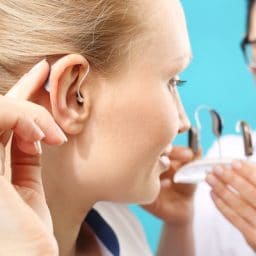The History of Hearing Aids
Think hearing aids are a new invention, created in San Diego just to treat baby boomers and those of the greatest generation? Think again. Hearing loss has been a problem since the beginning, and when there is a problem there are often people actively trying to solve it. For many years, individuals with hearing loss…
May is Better Hearing & Speech Month
Every May since 1927,the American Speech-Language-Hearing Association (ASHA) has been educating the public about hearing and speech disorders. The cause gained even more traction in 1986 when President Reagan issued a formal proclamation designating May as the official month to encourage people to take action if they believe there might be a problem with their…
Do You Have Hearing Loss?
While there are 48 million people in San Diego and around the country with hearing loss, it may be surprising to learn that many of these individuals would answer no to this question. That is because hearing loss is a progressive condition. It appears gradually over time so some simply do not realize they are…
What are Musician Earplugs?
Noise-Induced Hearing Loss Hearing loss caused by exposure to loud noises, known as noise-induced hearing loss (NIHL), is one of the most common and preventable types of hearing loss. It is estimated that 15 percent of Americans between the ages of 20 and 69 are experiencing hearing loss that is the result of exposure to…
Dating with Hearing Loss
Dating is hard enough; add hearing loss into the mix and the whole thing seems daunting. But San Diego audiologists agree that with a few little tweaks to the process, you can date to your heart’s content. Below are our top tips. Location is King Just like in real estate, picking the right date spot…
What is Real Ear Verification?

If you are in the process of getting a hearing aid, no doubt you have had your fair share of fittings. One of the most important ones is called a real ear verification test, as it is used to program your hearing aid to your specific type of hearing loss. Why is Fitting Your Hearing…
Hearing Loss from Balloons?

A new study by a pair of researchers at the University of Alberta found that the sound of a popping balloon can be louder than a gunshot. Noise-Induced Hearing Loss Sounds are measured in decibels; anything over 85 dB can cause hearing loss. Noise induced hearing loss is caused by exposure to an extremely loud…
How to Test Kids for Hearing Loss
Nearly three of every one thousand babies are born with some form of hearing loss. In most cases, however, hearing issues aren’t discovered in children until they are at least two years old. The first two years of a child’s life are hugely important in physical development as well as in forming emotional, learning and…
The Dangers of Cotton Swabs
Your San Diego audiologist would be the first to tell you not to put something in your ear. And of course you would agree with them! I bet you even still agree with them when you are using a cotton swab to clean out your ear after a shower. Unfortunately, cotton swabs are in fact…
Why Socialization is Good for Your Hearing
We previously published an article about the role socializing plays in your ability to hear. One study suggested that more social interactions increase your capacity to understand social sounds. It also showed that these sounds can physically modify the ear to increase sensitivity, though the precise location of this change is unknown. This research has…